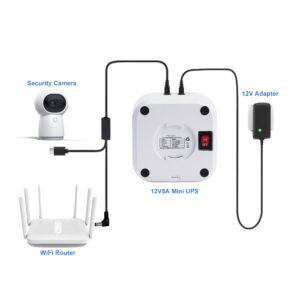In an increasingly digital world, uninterruptible power supply (UPS) systems are essential to ensure smooth operation of everything from home networking and surveillance systems to basic office equipment. Among these solutions, the Mini UPS has emerged as a practical and efficient option for providing backup power to small devices such as routers, cameras, and alarm systems.
However, the true effectiveness of a Mini UPS lies not only in its ability to provide power during a power outage, but also in its ability to protect and optimize the performance of the batteries that power it. This is where the Battery Management System (BMS) comes into play. The BMS is the intelligence behind the Mini UPS, ensuring safe, efficient, and long-lasting battery operation. In this article, we’ll explore how the BMS in a Mini UPS device works, how it improves battery safety and lifespan, and why it’s essential to ensure reliable performance in emergency situations.

1.What is a Battery Management System (BMS)?
A Battery Management System (BMS) is an electronic system that manages and monitors the performance of the batteries within a Mini UPS. The BMS ensures that the batteries are operating within safe and optimal parameters by continuously monitoring factors such as voltage, current, temperature, and charge cycles. The BMS acts as a safeguard against issues such as overcharging, over-discharging, and overheating that can cause battery damage or failure.
Essentially, the BMS ensures that the Mini UPS operates smoothly and efficiently, extending the life of the batteries while maintaining their safety. Without a proper BMS, the batteries can be exposed to damaging conditions that shorten their life and reduce the reliability of the entire power system.
2.Main Functions of BMS in Mini UPS
Preventing Overcharging and Overdischarging
One of the most critical roles of BMS in mini UPS is to prevent overcharging and overdischarging of batteries. Overcharging occurs when batteries are charged beyond their maximum capacity, while overdischarging occurs when batteries are drained below safe voltage levels. Both of these conditions significantly shorten the life of the battery and can cause failure.
The BMS continuously monitors the voltage level of the battery and stops charging when the maximum voltage limit is reached (usually around 4.2V for lithium batteries). Similarly, the BMS prevents overdischarging of the battery by shutting off power when the voltage falls below a predetermined threshold (usually around 3.0V). By maintaining the battery within a safe voltage range, the BMS ensures optimal performance and life.
Temperature Regulation
Temperature control is another important function of the BMS in Mini UPS devices. Batteries, especially lithium batteries, can become very sensitive to extreme temperatures. Overheating can cause the battery to degrade faster and can even cause swelling or thermal runaway, a dangerous condition where the battery overheats and can explode.
The BMS includes temperature sensors that monitor the internal temperature of the battery in real time. If the temperature exceeds a safe limit, the system will shut down the device or reduce the charging rate to avoid overheating. This intelligent temperature regulation is critical to maintaining the safety and stability of the battery, especially in environments where mini UPS devices may be exposed to temperature fluctuations.
Balancing Battery Voltages
Many modern mini UPS systems use multi-cell batteries, where multiple individual cells are connected in series to achieve the desired voltage. However, due to minor manufacturing variations, these cells may not charge or discharge evenly. When individual cells are unbalanced, the performance and life of the entire battery can be negatively affected.
The BMS plays a vital role in balancing the voltage of each cell, ensuring that all cells charge and discharge at the same rate. This cell balancing helps maintain the overall health of the battery, prevents overcharging of specific cells, and ensures even energy distribution throughout the battery pack.
Short-circuit and overcurrent protection
Mini UPSs are often faced with varying power demands from the devices they support. These demands can result in high currents that, if not managed properly, can cause short-circuit or overcurrent conditions that can damage the battery or other internal components.
The BMS is equipped with circuits that can detect abnormal current fluctuations (such as short circuits or sudden spikes) and take corrective action. This may include shutting down the UPS, limiting the current, or activating safety mechanisms to prevent further damage. These protection features ensure that the Mini UPS remains safe and operating properly even in the event of a power surge or other electrical fault.

3.How BMS Extends Mini UPS Battery Life
Optimized Charge and Discharge Cycles
A battery’s charge and discharge cycles directly impact its overall lifespan. With proper management, a battery can withstand thousands of charge cycles without noticeable performance degradation. A BMS ensures that each cycle is optimized, preventing deep discharge and unnecessary overcharging, both of which can compromise the health of the battery.
By carefully controlling the charge rate and discharge threshold, a BMS ensures that the battery’s capacity and efficiency are maintained for as long as possible, allowing it to be used for longer without premature replacement.
Extending the Lifespan of Batteries
With a mini UPS equipped with a BMS, users can expect significantly longer battery life. The BMS’s intelligent management ensures that the battery operates within safe parameters, minimizing the stress placed on the battery during each charge and discharge cycle. Over time, this reduces wear on the battery’s internal components, extending the number of years the battery will remain functional.
Without a BMS, the battery is more likely to charge inefficiently, overheat, or reach unsafe voltage levels, all of which accelerate wear and lead to a shortened lifespan. For small UPS devices, where batteries need to be charged and discharged frequently, having a BMS can have a significant impact on the overall durability of the system.

Conclusion: The Role of BMS in Mini UPS Systems
The Battery Management System (BMS) is an essential component of any mini UPS, providing intelligent monitoring of battery performance, ensuring safety and extending its life. Through features such as overcharge protection, temperature regulation, battery balancing and short circuit prevention, the BMS ensures that the Mini UPS operates safely, efficiently and reliably even under the most demanding conditions.
For users seeking a reliable backup power solution for their critical equipment, a Mini UPS with an integrated BMS provides optimal safety and performance. With the increasing reliance on electronic devices and the growing demand for uninterruptible power supplies, investing in a Mini UPS with intelligent battery management is essential to protect valuable equipment and ensure long-term reliability.





